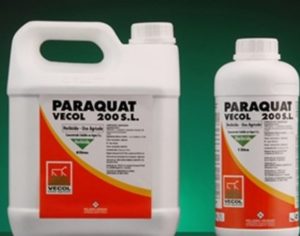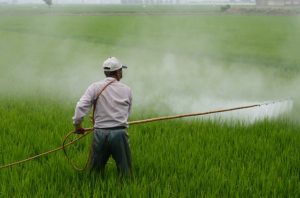Manufacturers of the herbicide Paraquat are facing potential class action lawsuits and dozens of individual injury claims for failing to warn about the risk of Parkinson’s disease associated with the popular toxic grass control and weed killer. Despite the manufacturer’s knowledge about the link between Paraquat and Parkinson’s disease, as well as other serious health risks, the herbicide has been distributed and sold without adequate warnings.

Paraquat is an herbicide sold by Chevron Chemical Company, Syngenta, and Growmark as a weed killer and post-harvest drying agent. It shares a similar chemical structure with a contaminant found during synthetic opioid development, which has been revealed to cause symptoms associated with Parkinson’s disease.
In 1997, the EPA announced that exposure to Paraquat during the mixing, loading, application, and post-application process represented the primary route of exposure to the chemical compound. While the herbicide is not registered for residential use, individuals who live near farms where the herbicide is used may have been exposed without being aware of its presence in their communities.
Since 1997, scientists have been examining the effects of Paraquat exposure on humans, particularly its link to Parkinson’s disease. A 2009 study revealed that any exposure to Paraquat within 1,600 feet of a home resulted in a 75 percent increased risk of Parkinson’s disease. In 2011, an influential study of Parkinson’s disease cases and pesticides revealed Paraquat as a significant concern. In 2014, another study reported a greater risk of Parkinson’s disease in individuals who had experienced exposure to Paraquat. In that study, researchers found that those who applied Paraquat suffered twice the risk of the disease compared to the general population. Finally, in 2016, the EPA announced it would be re-evaluating Paraquat and its potential link to Parkinson’s disease.

To date, the manufacturers have not stopped selling the product nor have they issued a warning about its potentially-dangerous side effects. Instead, Chevron, Syngenta, and Growmark continue to rake in billions of dollars in profits, with $640 million in global sales in 2011 alone. In fact, Syngenta claimed that data from a 2011 study showed that farmers who use Paraquat are less likely to develop Parkinson’s disease, a claim that the authors of the study denounced as totally at odds with the actual findings.
Paraquat remains one of only two herbicides still being used in the United States despite being banned (or in the process of being phased out) in 32 countries, including China, the EU, and Brazil. A U.S. Geological Survey indicated a doubling of the product’s use in the United States from 2013 to 2017, when estimated use reached 10 million pounds annually.
The Centers for Disease Control and Prevention (CDC) considers Paraquat to be more toxic than other herbicides, as it has been known to cause burns, birth defects and cancer as well as Parkinson’s disease. Parkinson’s disease is a chronic and progressive brain disorder that causes shaking, stiffness, difficulty walking, and other debilitating symptoms that worsen over time. While many people believe that genetics are the cause of Parkinson’s, research has shown that genes are primarily involved in only about 1-in-10 cases of Parkinson’s. On the other hand, the evidence linking Paraquat to Parkinson’s is so strong that scientists commonly use the chemical to artificially create Parkinson’s symptoms in animal test subjects while studying the effects of the disease.
Since its introduction in 1962, Paraquat-based products have been sold by Chevron Chemical Company, Syngenta, and other companies under the following brand names: Gramoxon, Paraquate Concentrate, Blanco, Cyclone SL 2.0, Firestorm, Helmquat 3SL, Bonedry, Devour, and Para-Shot 3.0.
If you or someone you know has been diagnosed with Parkinson’s disease after being exposed to Paraquat or a branded Paraquat product, you may be entitled to compensation. Call Allen & Allen for a free consultation today, at 866-388-1307.



